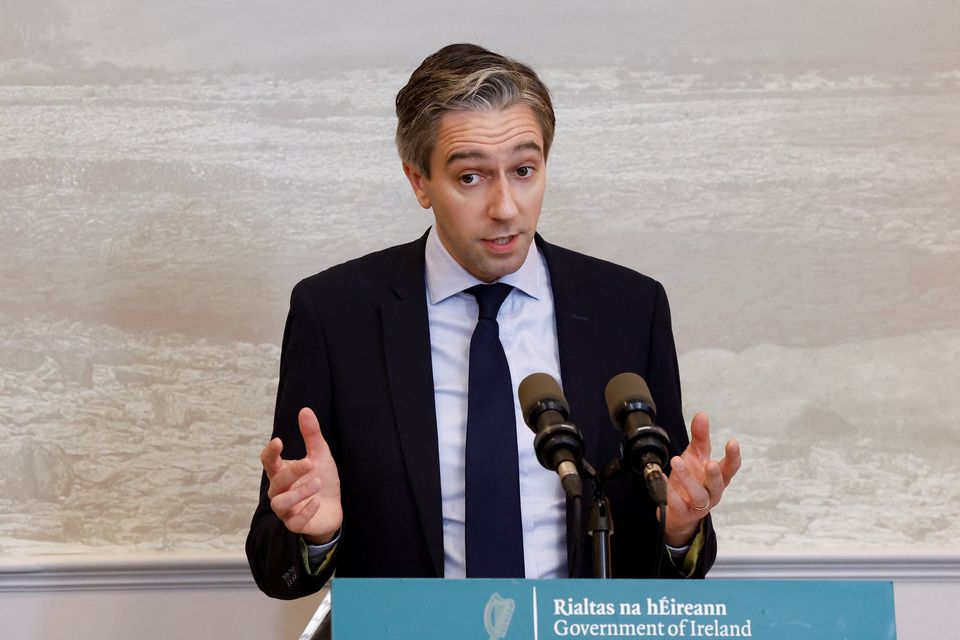Letters: We lost our son to suicide with alcohol a contributing factor and now the review of health warnings on alcohol is a kick in the face for us
Tánaiste Simon Harris says serious consideration is being given to a social media ban. Photo: Clodagh Kilcoyne
Madam — At our 19-year-old son’s inquest in 2011, the coroner determined that his death was “suicide, with alcohol a contributing factor”.
The coroner allowed me to address the court and, as a result, our views on alcohol received a lot of media attention. Our views were that it was too cheap, too available and the country was saturated with advertisements for it.
We gave our support to the passing of the Public Health (Alcohol) Bill. Then health minister Simon Harris thanked my wife and I publicly for our input into getting the bill passed. At the time, I had great respect for Mr Harris and his unwavering determination to take on the alcohol industry.
In the past few weeks, something really strange happened. Finance Minister Paschal Donohoe called for the introduction of health warning labels on alcohol, which were due to become law in May 2026, to be examined again.
His reason was with new US tariffs the labelling would be detrimental to the alcohol industry. Shortly afterwards, Mr Harris backed him on his stance.
To say we are disappointed is an understatement. I find it hard to understand why a man who fought such a sterling battle against the alcohol industry has now become a traitor to what we fought for.
Some might think these are harsh words, but when you consider the time and effort so many people and organisations put into the passage of the Public Health (Alcohol) Act and the unrelenting concentrated efforts by the alcohol industry to derail the passage of the bill, I think these words are justified.
To try and reverse something he was instrumental in passing is beyond belief. Mr Harris, your words of praise for us are now meaningless and I’m sure the alcohol industry is clapping its hands with glee.
John Higgins, Ballina, Co Mayo
Artists must be free to express themselves
Madam — Eilis O’Hanlon describes how rap group Kneecap refuse to explain why they consider their actions to be taken out of context. But it is important to remember that these are not the actions of politicians, but of artists in the context of performative art.
Art is free to be interpreted by the consumer and evaluated and scrutinised by the spectator, but there is a great beauty in the fact that artists are not obliged to explain the meaning behind their work.
Pablo Picasso carried a pistol loaded with blanks and shot anyone who dared ask such questions.
When his masterpiece Guernica was painted, he was labelled a degenerate by critics as it drew attention to violent atrocities — yet he remains one of the most significant artists in modern history.
Art serves as a lens through which the creator’s own reality is reflected. It is a vehicle for raw human expression; it is used to explore trauma and freely critique society.
WB Yeats himself wondered if his plays led to men getting shot. Yet his works are still studied in universities.
Certain people will find Kneecap’s performances disturbing or their words disgusting. They may think their existence abhorrent and their ideas dangerous, and they are entitled to do so.
But much like the bells of Guernica ringing in solidarity with Gaza, for some, it is welcome music to their ears. There are those who would consider the work degenerate and others who would consider it exquisite.
Either way, their work resonates on a deep level and isn’t that, in itself, fine art?
Elliot McCarthy, Tower Street, Cork
Focus must stay on Gaza — not Kneecap
Madam — Eilis O’Hanlon is on shaky ground when she criticises Kneecap (‘Our politicians should take a stand and stop tip-toeing around Kneecap’, May 4).
As a columnist in another newspaper says: “Punk and hip-hop bands have been singing about killing queens and presidents for decades.”
Kneecap are not the story. The appalling loss of life in Gaza, almost all of it inflicted from the air on defenceless people — including journalists and medical personnel — is. It must remain our unrelenting focus.
Tom McElligott, Listowel, Co Kerry
Have we abandoned the Palestinians?
Madam — The genocide in Gaza is now beyond catastrophic. The warnings by Dr Michael Ryan of the World Health Organisation (WHO), Peter Power of Unicef and UN secretary general Antonio Guterres are being ignored by our Government and the so-called international community, who have abandoned the Palestinian people, and ignored their own responsibilities towards the proper rule of international and humanitarian laws.
The UN has been rendered powerless by abuses of the powers of veto. Ireland has failed to effectively use its membership of the UN and EU to advocate on behalf of the Palestinian people and to uphold international humanitarian laws.
Our Government’s plans to remove the triple lock undermines the role of the UN, and it is failing to process the Occupied Territories Bill in a timely manner.
This genocide must be ended and all those responsible for it, or complicit in it, must be held to account as soon as possible, otherwise humanity is in danger as the rule of brutal force replaces the proper rule of law.
Edward Horgan, Castletroy, Limerick
You can never fight hatred with hatred
Madam — It was very impressive to hear a recent radio interview with the compassionate army chaplain who forgave the young man who attacked him with a knife at Renmore Barracks in Galway.
Fr Paul Murphy has a clear message: “We have to combat hatred with reconciliation and not with more hatred.”
If this message could in some way be adopted by leaders in the Middle East, surely we would see a rapid end to the unspeakable suffering of the people of Gaza, who are besieged without food, water or a safe place for themselves or their children to lay their heads.
Eamon Fitzpatrick, Strandhill Road, Sligo
GAA should bow to ladies over skorts
Madam — I am not far from thinking that our Gaelic games organisations are trying their best to self-destruct, what with allowing swarm-tackling and excessive hand-passing in football, throwing the sliotar in hurling, playing too many games in close proximity and too early in the year — and now, to add a bit of unnecessary commotion, the wish to inform the ladies of their superior knowledge of skorts.
Michael Teehan, Moyglass, Co Tipperary
Players must decide on what they wear
Madam — It’s almost unbelievable that in a modern, developed, civilised country, young women are being barred from wearing shorts while playing camogie.
Well done to every one of the players, who give their time and effort to compete and entertain.
They themselves know what gear is most suitable, comfortable and safe. They themselves must be allowed to decide.
Margaret Walshe, Dublin 15
Faith has not gone away, you know
Madam — In response to David Quinn’s assertion that liberalising the Catholic Church will not revive it, I propose that “revival” may not be the most appropriate metric for assessing religious vitality — particularly if measured solely by church attendance or the number of converts in Africa (‘Making the Catholic Church more liberal will not revive it’, May 4).
Western Christianity may no longer fill pews as it once did, but that does not signify the disappearance of religion.
In the 1950s, 10-pin bowling was the most popular team sport in the US.
While it may not hold that title today, it remains that nation’s top participatory sport, with over 67 million people bowling at least once per year.
Similarly, people may be less involved in formal, organised religion — but spiritual and moral inquiry persists, albeit in less conventional forms. From podcasts and pilgrimages to social justice movements, many people continue to engage in spiritual practices, even if they do so independently.
Assuming that relevance lies solely in strict orthodoxy overlooks the quiet persistence of faith in modern Western life.
Enda Cullen, Tullysaran Road, Armagh
Needs of autistic children are ignored
Madam — I am a 14-year-old disability rights campaigner, once more forced to take my campaign to the gates of Leinster House.
I am staging a 50-hour protest there, to highlight the appalling situation whereby the Government is breaking the law on assessments of needs, by failing to assess children within six months, as outlined in the Disability Act 2005.
The Government does not dispute that permanent damage is being caused to children by the failure to assess in a timely manner. Last October, Simon Harris directly credited my campaign with the allocation of €10m towards assessments of needs backlogs.
While I’m very grateful for that, it has not led to systematic change. In fact, waiting lists have only increased.
So, I return to Leinster House on May 20 with a clear question for Cabinet: will they continue to be lawbreakers, or will they finally stop the permanent damaging of autistic children? The nation awaits your answer.
Cara Darmody (14), Ardfinnan, Co Tipperary
The style guide is the journalist’s bible
Madam — For a long time in the Sunday Independent, the word “Mass” has been given a lower-case letter “m” This is an error, as the word “Mass” (as in Catholic liturgy) is a proper noun, thus deserving a capital “M”, anywhere it appears in a sentence.
Several of your contributors and an occasional letter-writer make this mistake. Indeed your good self made the same error in your Letter from the editor last Sunday. Wishing you the best of luck in your new role.
Aidan Grennan, Rahan, Co Offaly
Note: Sunday Independent sub-editors adhere to the Mediahuis Style Guide, which dictates that in our publications the word ‘mass’ takes a lower-case m.
So many evil regimes began with racial hate
Madam — Amid the 80th anniversary celebrations of the official end of World War II in Europe, it’s sobering to think that racism, which was at the heart of the evil regime the Allies defeated, has made a comeback.
I listened recently to an old interview with an Irishman who was among the first Allied soldiers to enter the Nazi death camp of Bergen-Belsen. He’d lost friends on the battlefield, had numerous brushes with death, and seen the ugliness of war up close.
But the Nazi concentration camp left him stunned and disbelieving. It was evidence of human cruelty brought to new levels.
We should never forget this horror only became possible once people fell under the spell of racism. It started with name-calling, the casting of racial slurs, the dehumanising of people of different ethnic origin.
In Britain, the VE celebrations are lavish and colourful.
How sad to see though, both in Britain and here, people using national flags to promote hatred of “others” such as refugees and asylum-seekers, with cries of “Our nation first!” or “Get them out!” echoing on the streets and on social media.
Unfortunately, unreasoning hatred of people on grounds of creed, skin colour or ethnicity still thrives. Will any of us live to celebrate VR Day — Victory over Racism?
John Fitzgerald, Callan, Co Kilkenny
Conlon sinks the black in fine style
Madam — I thought Tommy Conlon’s article on Rory McIlroy winning the Masters could not be equalled. But his piece on Ronnie O’Sullivan’s demise came close. ‘Rocket finally crashes to earth’ was once again out of this world.
John McCann, Donegal
No power grid can avoid blackouts
Madam — Conor Skehan’s piece on green energy last Sunday failed to mention the simple truth that no grid is immune from blackouts. Renewables do require more managing, in terms of maintaining the grid’s frequency. But this does not mean blackouts are a given.
Skehan also conflates high electricity prices in Ireland with renewables. Doesn’t the significantly cheaper price of electricity in Spain compared to Ireland show this is the case?
Electricity prices are set by the most expensive source — called the “marginal price” —that has to be “turned on” to meet demand. And our reliance on gas in part explains our high electricity prices.
This is not to deny there is a cost to renewable infrastructure. Nor does it mean that we will eliminate natural gas as a back-up energy source by 2050, although long-term hydrogen storage is a plausible solution.
The real issue is that the Government does not have a coherent and cogent strategy. Both the National Economic and Social Council and the Irish Academy of Engineering have highlighted the lack of an implementation strategy, costings and planning. This is in part illustrated by the fact that we are turning off wind turbines because of grid constraints.
Andy Hales, Kenmare, Co Kerry
Housing tsar needed – builder must apply
Madam — the Government’s latest answer to the housing crisis is the appointment of a so-called housing “tsar” to head up a Housing Activation Office.
But the function of this new body is supposedly to cut through the red tape which is mostly created by the Government, knock heads together and get on with the job of building houses.
If the housing minister and his department are not up to the job, they should resign. But if such an appointment is really deemed necessary, an experienced builder who understands the regulations and planners should be the preferred candidate to lead it.
Brian Lube, Co Meath
Donald trumped by a greater American
Madam — How will Donald Trump cope with the fact that he is no longer the most famous American in the world, now that Chicago-born Pope Leo XIV has assumed office?
Not very well, I suspect.
Expect a tantrum sooner rather than later.
Tommy Roddy, Ballybane, Co Galway
Hands up who wants another tipple?
Madam — While having a few pints with a friend recently, he told me his wife had kindly offered to give us a lift home when we had ended our little session.
When he rang her, she told him she had just painted her nails, and would be about half an hour behind schedule as she waited for them to dry.
So there we had it... a nailed-on excuse for having another.
Tom Gilsenan, Beaumont, Dublin 9
Thanks from the US to the friendly Irish
Madam — I’m just back from a 10-day visit to your beautiful country. The Book of Kells was a highlight, as was Kilkenny Castle — and the Dingle Peninsula took my breath away.
But most of all, everyone I met was so friendly and welcoming — and that made my visit extra special. Thank you.
Mike Hill, St Charles, Illinois, USA
Join the Irish Independent WhatsApp channel
Stay up to date with all the latest news















